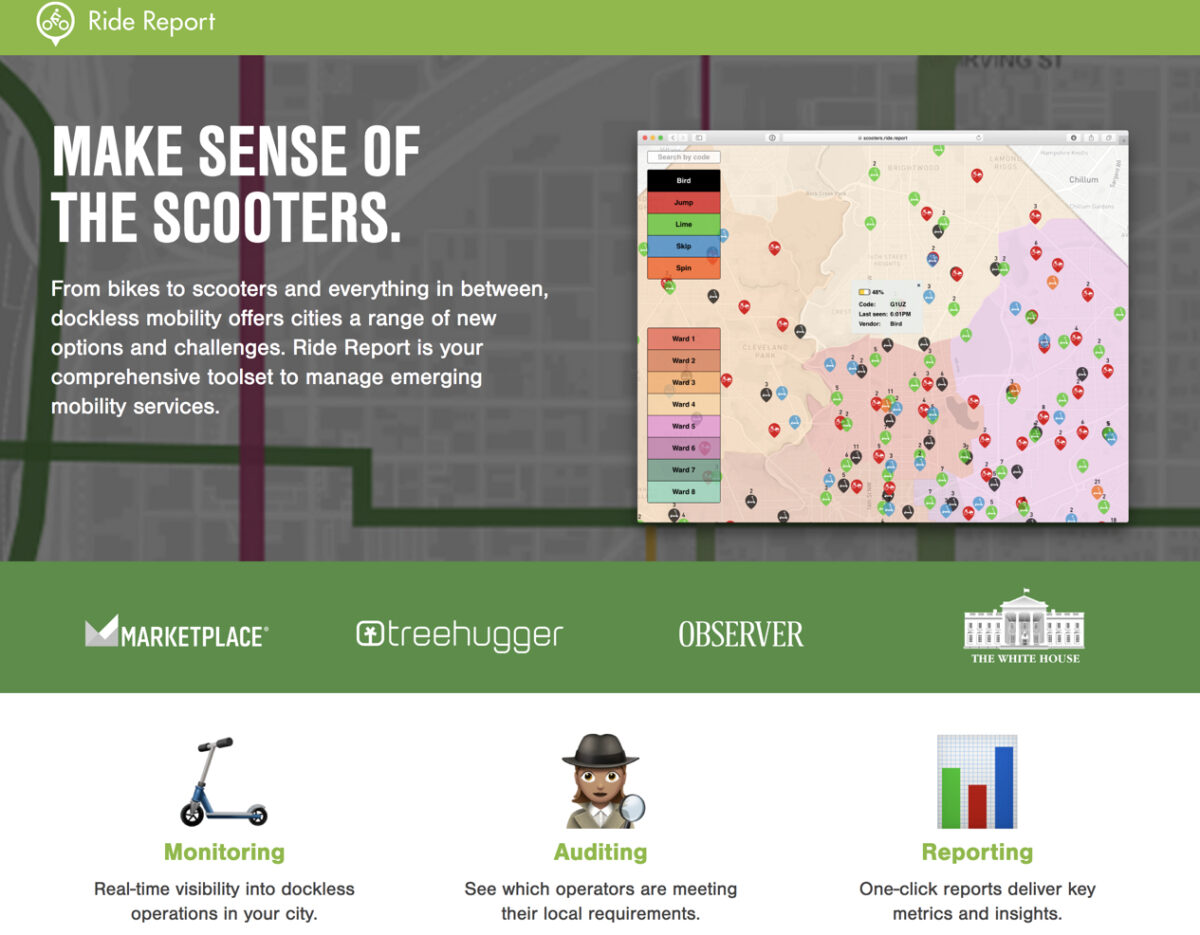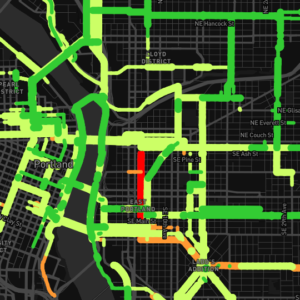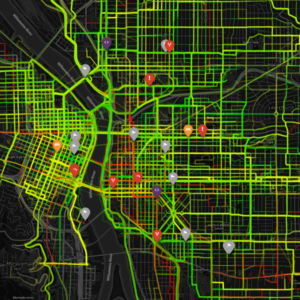
When we first profiled Knock Software in 2015 we said their small device that counts bicycle traffic would “change planning forever.”
Nearly four years later that device is no longer part of their business, but the company itself has more than lived up to the headline.

(Photo: Jonathan Maus/BikePortland)
Knock, makers of the Ride Report app and a transportation data dashboard used by cities, just completed a $2.6 million funding round and has raised $3.4 million since the start of this year. The $2.6 million comes from three Bay Area funders including: Better Ventures, a social impact fund based in Oakland; the Urban Innovation Fund; and San Francisco-based Homebrew. The other $800,000 came from individual angel investors.
For a company that never sought outside funding prior to 2018, Knock is on a very exciting new trajectory.
According to Ride Report CEO and Co-founder (and recent Alice Award recipient) William Henderson, the electric scooter revolution has also revolutionized his business.
“We’re signing up 1-2 cities per week right now. It’s an insane pace and what’s cool is that we have an awesome team.”
— William Henderson
From their first experience working with the City of Portland to measure bike traffic on SE Clinton Street in 2015, Henderson and co-founder Evan Heidtmann noticed a growing gap between cities and tech companies.
As arterial streets clogged during rush-hour, apps like Waze and Google Maps were directing drivers onto Clinton Street. This caused a lot of concern and stress for bicycle users. Henderson’s theory was that the algorithms used by Waze and Google favored Clinton because it lacked stop signs (done to encourage biking) and it had the highest average driving speeds. To solve the problem, PBOT had to do a traffic study and eventually installed a series of median diverters.
“The big lesson for me,” Henderson shared on the phone this morning, “Was that a tech company can simply tweak its algorithm and it breaks our transportation system. That’s crazy.” It was a precursor to a growing issue many cities have faced the past few years: they can’t keep up with high tech corporations. “Cities get caught off-guard,” he continued. “We see that again and and again with companies like what Uber and Lyft did with ride-hailing. They have tons of control and can tweak their algorithm… they don’t share data on things like surge pricing which can dictate how many people use their service, and the city has no say where pick-up and drop-offs can occur.”
The arrival of dockless bike share and e-scooters have turned the demand for real-time data and analysis up to 11.
Henderson now realizes that “The need for data transcends just counting traffic.” He believes when cities have better access to data, they have more power to make sure these new technologies are deployed in a way that aligns with their values. Combine data with real feedback from users via the Ride Report app and you have an even more powerful combination.
Advertisement
“Cities are launching scooters and have no idea where they are, how many are on the street, and how many are in compliance with regulations.”
— William Henderson
Cities that got brow-beaten by companies like Uber and Lyft with ride-hailing are taking a much stronger stance against scooter companies. Knock had seen solid demand for its data dashboard for cities that included traffic counts, user data from the Ride app, and data from open-source mapping engines. Then they brought scooter data into the mix and were flooded with business.
“Cities are launching scooters and have no idea where they are, how many are on the street, and how many are in compliance with regulations. They just don’t have that type of data.” Knock’s Micromobility Dashboard changes that equation and gives cities real-time access to scooter and bike share data. If you’re a PBOT staffer and need to see if a company has 20 percent of their fleet in east Portland, you don’t have to rely on the company’s word. You can just pull up the dashboard and check.
“Now we have a product that appeals to a very acute need, and overnight we started seeing much much faster sales,” Henderson said.
City contracts that had taken 1-3 years to set up, suddenly happened “In a matter of days.” “When we saw that,” Henderson said, “We thought, wow, we have something.”
With fast growth and a product he believes in, Henderson sought outside investors to stay ahead of the competition and build a successful company. He believes Ride Report can play a key role in being a facilitator between transportation-focused tech companies and cities. The way he sees it, private companies might want people to cycle and scoot, but they won’t be thinking about things like equity, Vision Zero, good connections to transit, and so on. “Those are things a city can manage, but only if they have these data tools because technology companies move fast and regulation cycles don’t.”
In addition to their expertise in combining traffic data into good planning decisions, Ride Report’s niche is in being a bridge between the often very different — and increasingly divisive — worlds of local governments and technology companies.
He’s also very optimistic about what micromobility can bring to cities. “This is what we love and this is the real opportunity to grow our business and to show that the scooters can be a positive thing were cities are in control and can manage the public benefit.” It’s Henderson’s view that if scooters are managed well they could be, “The best thing that ever happened for biking in Portland,” as the companies behind them become proponents for infrastructure investments that keep vulnerable users (their customers) safe and make trips as convenient and efficient as possible.
Ride Report’s data dashboards are free for cities to use. They pay when they want more specialized analysis and customizations. Currently 20 cities use the dashboard and 13 are utilizing paid services. But that list is growing fast. “We’re signing up 1-2 cities per week right now. It’s an insane pace and what’s cool is that we have an awesome team.”
On that note… Ride Report plans to do a lot of hiring, especially urban planners and customer support staff. If you’re interested, keep your eye on our Job Listings. Learn more about the company at Ride.Report.
— Jonathan Maus: (503) 706-8804, @jonathan_maus on Twitter and jonathan@bikeportland.org
Never miss a story. Sign-up for the daily BP Headlines email.
BikePortland needs your support.







Thanks for reading.
BikePortland has served this community with independent community journalism since 2005. We rely on subscriptions from readers like you to survive. Your financial support is vital in keeping this valuable resource alive and well.
Please subscribe today to strengthen and expand our work.
I downloaded Ride Report last April after reading about it on Bike Portland. I wanted my rides in North Portland to be counted by the City. The app has exceeded my expectations. It has very low battery use, and it is remarkably good at knowing when I ma biking, walking or driving. It is also really fun to see my weekly and monthly totals- previously I would only track my longer rides. It is easy to see how this would be a benefit to transportation staff, and I would recommend to any cyclist. In hte future, I hope they add a feature to report problem spots- many, even most, of my rides are 75%-95% chill, but every ride has at least one poor connection or stretch. Without being able to point to the trouble spots, I have a hard time knowing how to categorize my rides, so I usually don’t.
Many congrats to the Ride Report team.
One bit of worry I’ve got: when I wrote that initial profile back in 2015, William told me he never wanted to accept venture capital because of what he’d seen it do to companies when he was working in the Bay Area. I don’t know the business at all and would never fault any entrepreneur for changing his mind, but I’d be curious to know why his view changed, if he’s interested in sharing. For mostly pleasant reasons, I hope.
Here’s a bit that didn’t make it into the story… From my notes: “I was worried when we accepted money we’d water down our values. But I believe we’re doing even more… Like our hiring process is more equitable because we can reach candidates we couldn’t have reached before because our investors care about having a diverse team.”
Worth noting is that all three investors closely align with Henderson’s values (or so it seems at this point) and my hunch is that he sees a big enough opportunity worth chasing ASAP that it was worth any potential pitfalls by going after venture funds.
I’ll let William come here and answer this himself.
Thanks for asking this question Michael, and thanks to Jonathan for adding a bit more from our conversation. I don’t think I’ve come full circle since 2015, but after 5 years of running a bootstrapped company my perspective has certainly changed. Venture Capital is definitely not a good fit for many companies. I think it gets overused, and it’s too bad it is treated as the only model for young technology-enabled companies. If you are starting a technology-enabled company, look for alternatives like Zebras Unite and Indie.vc!
I also think many companies take too much money too early and for the wrong reasons. When you take money early, you don’t have to think about your business model. Most of venture-funded companies die out, but the ones that survive often don’t have a lot of choices about their business model by the time they really begin building it.
When we started working on Ride Report, it was first and foremost about our mission: “to empower cities with tools to help them make transportation more equitable, efficient and sustainable.” That’s what we are passionate about and that’s the change we are working to affect. What I still believe is that if you are actually a values-driven company – and you want to stay that way as your grow – then you have to think on day 1 about what your business model is and whether it actually aligns with your mission. For us, we recognized that we had to figure out how to sell things to cities. That’s a hard job – city procurement is not easy! – but it’s the one that puts us in long term alignment with the goals cities have. We knew that other business models – advertising, or making money in the app – didn’t necessarily have that alignment long-term.
And in 2015, choosing that business model and mission meant that we could not raise venture capital and stay true to our values. For one thing, we didn’t have the experience or track record to make most investors comfortable (did I mention that city procurement is hard?). So we spent 3 and half years building that business, slowly going from pilots in a couple of cities to large contracts in over a dozen. Of course, now scooters are the hot thing and raising money around anything related to them is much easier. We suddenly have competition, and they’re raising money, and so that means that we need to grow faster than continuing to bootstrap might allow.
When we decided to look at raising outside money, we agreed that we would only go through with it if we found investors who shared our mission and values *and* believed in our business model. We wanted them to be aligned and stay aligned. And to be honest, we were a bit skeptical about whether we’d actually find that. We were pleasantly surprised to find such a great fit in our investors. They were saying all the right things, and that impression was confirmed when we dug in to talk with the founders and partners they’d worked with in the past. Even more surprising, we started learning things from our investors about how we could build our company in a way that was *more* true to our values. I think that was when we knew it was the right choice.
So, to come full circle on this: I still believe venture capital is not a good fit for many businesses at many stages. I still believe you should put off taking other people’s money (OPM) as long as you can, that you should start with a focus on building a business around the customers you want to serve. And I believe that if and when you choose to take OPM, you should interview them as rigorously as you would any member of your team. In the end you should only take OPM if you are convinced those people will help you be more true to your mission and values.
Congrats! The VC funding gig can be such a double edged blade…glad you succeeded!
Beware of entrepreneurs bearing computers.
seems like something like Ridewithgps or any other ride app could already easily do
I’m really excited to see scooters and other modes worked into traffic models. The only way to find transportation solutions will be to understand the reality on the ground. I look forward to finding a way to integrate skateboarding into this software.
Hey Cory, do you ever use an electric longboard or a Onewheel? I’ve been curious about powered boards since I was a kid.
So i have been using the ride.report app since i moved to Portland, and really appreciated this app’s stressmap for figuring out which were the best ways to get around. Now that i’ve been here for a while, i use it less for that, but i have still really enjoyed using it and discovering the cute badges and stuff.
It seems, though, that the latest update (late June?) has completely broken the map integration, and no one seems to be responding about the issue, even though it renders the app basically useless for its main purpose, either to users trying to find a good route, or to analysts hoping to get good rider data (as we cannot actually rate rides or correct them when it incorrectly assigns modes of transport).
If you look at the ride.report website, it indicates that they started adding electric scooters in that June update… i wonder if that is what broke it all??
I started looking around online to find support/reasons for the broken app, and stumbled on here… which is why i am commenting here now…
Anyway, i was hoping someone might be able to recommend me an alternative biking app they like which would still help with stressmap routeplanning, or have local Portland fun in it, but at the very least help me keep track of just how many miles my bike is getting? Or even better, maybe some inside knowledge of app improvements just over the horizon to keep my hopes up?
Thanks!